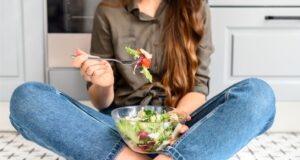Clean eating makes you feel healthier, fitter and can even shed a few pounds
This is not about washing fruits and vegetables, no. Clean eating is all about natural, unprocessed foods. With this principle you make wholesome and healthy foods the basis of your diet.
The result: With this “clean” food you consume more vitamins and minerals, as well as complex carbohydrates and healthy fats. And a lot less unnecessary, unhealthy additives.
Which foods are allowed?
Natural foods are characterized by no, or minimal, processing before you put them in the shopping cart. Easy to identify: Unpackaged foods are often of natural origin, such as fruit and vegetables.
But good meat and fish, as well as nuts and seeds, legumes, whole grain cereals, dairy products, vegetable oils, and even sugar alternatives such as honey or coconut blossom sugar are allowed.
For packaged foods, however, you should rather take a look at the list of ingredients: the longer and more complicated the list of ingredients, the more unnatural the food is usually. Flavor enhancers, artificial flavors and colorings are often hidden here.
What do I have to look out for when eating clean?
So that you can exploit the full potential of clean eating, you should try to stick to a few guidelines. Since clean eating is a long-term change in diet and not an (unhealthy) crash diet, you don’t have to put yourself under stress – the main thing is that you stick with it and don’t give up. It’s better to start slowly, but be consistent.
Among other things, you should avoid white sugar. Industrial, refined sugar can be found in almost every processed food and is therefore consumed in far too high quantities. It makes your blood sugar fluctuate, has tons of calories, but no healthy nutrients. Instead, eat plenty of complex carbohydrates, healthy fats, and plenty of water. 9 more rules for a successful clean eating strategy can be found in the theory part of our nutrition plan.




